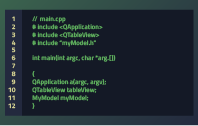Solutions for Application Development

As a developer, you most likely have a favorite operating system, toolchain, and language. At work, the choices might be made for you, but Qt gives you some freedom by enabling you to maintain a single software code base across all operating systems, platforms, and screen types, from desktops and embedded systems to business-critical applications, in-vehicle systems, wearables, and mobile devices connected to the Internet of Things.
The options are endless, but the following table summarizes the solutions available for different types of target platforms or industries with links to more information.
| To Develop For | You Need |
|---|---|
| Desktop | Qt for Linux, macOS, or Windows with the appropriate Qt modules, depending on what your applications will be used for. |
| Mobile Devices | Qt for Linux, macOS, or Windows and for the mobile device platform that you want to run the applications on. For example, Qt for Android or Qt for iOS. |
| Embedded Devices | Boot to Qt, Qt for Android Automotive, or Qt for Automation. |
| MCUs | Qt for MCUs |
You can use C++, QML, or Python for application development:
| To Develop With | You Need |
|---|---|
| C++/Qt | Qt for Linux, macOS, or Windows |
| QML/Qt Quick | Qt for Linux, macOS, or Windows |
| Python | Qt for Python |
© 2023 The Qt Company Ltd. Documentation contributions included herein are the copyrights of their respective owners. The documentation provided herein is licensed under the terms of the GNU Free Documentation License version 1.3 as published by the Free Software Foundation. Qt and respective logos are trademarks of The Qt Company Ltd. in Finland and/or other countries worldwide. All other trademarks are property of their respective owners.